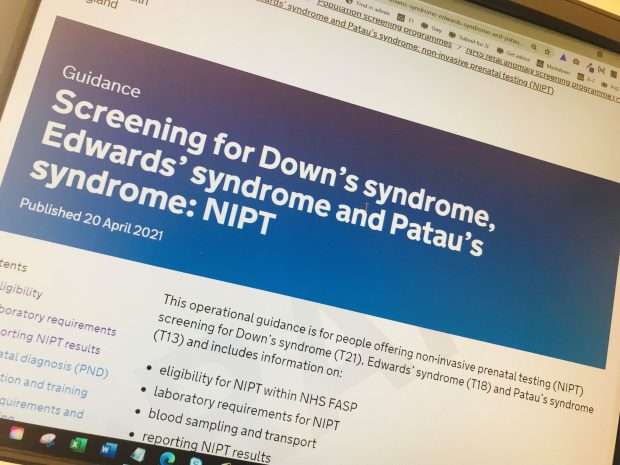
Non-invasive prenatal testing (NIPT) will be added to the existing NHS screening programme for Down's syndrome, Edwards' syndrome and Patau's syndrome as part of an evaluative rollout from 1 June 2021.
PHE Screening has today published new operational guidance on NIPT to support this change to the screening pathway.
The publication will support maternity providers, laboratories and commissioners and includes information on:
- the offer of NIPT
- eligibility for NIPT within NHS FASP
- blood sampling and transport
- reporting and managing of results
It was developed by the PHE FASP programme team in collaboration with a working group of colleagues from fetal medicine, maternity, genetic science, quality assurance and NIPT laboratory providers.
Who's eligible
NIPT can be offered to women who receive a higher chance result from a combined or quadruple test taken on or after 1 June 2021 as part of the NHS screening pathway. A higher chance result is 1 in 2 to 1 in 150. A lower chance result is 1 in 151 and higher.
NIPT can be offered and performed in singleton and twin pregnancies up to 21 weeks and 6 days (21+6).
NIPT cannot be offered and performed when a pregnant woman has:
- cancer, unless in remission
- received a blood transfusion in the previous 4 months
- had bone marrow or organ surgery
- immunotherapy in current pregnancy, excluding intravenous immunoglobulin (IVIg) treatment
- had stem cell therapy
- a vanished twin pregnancy
- Down’s syndrome, or balanced translocation or mosaicism of Down’s syndrome, Edwards’ syndrome or Patau’s syndrome (genetic material)
NIPT results
NIPT screening will report individual chance results for Down’s syndrome, Edwards’ syndrome and Patau’s syndrome. These results will be reported as either lower chance or higher chance. For example, depending on the woman’s choice, NIPT results will be reported as:
- separate chance results for all 3 conditions
- one chance result for Downs’ syndrome only
- one chance result for Edwards’ syndrome and one chance result for Patau’s syndrome
This is an important difference to the combined test, which reports a joint chance result for Edwards’ syndrome and Patau’s syndrome.
Women and healthcare professionals need to be aware that NIPT as part of the NHS FASP screening pathway will:
- only screen for Down’s syndrome, Edwards’ syndrome and Patau’s syndrome
- not detect other chromosomal or genetic conditions
- not assess fetal sex
PHE Screening blog
The PHE Screening blog provides up to date news from all NHS screening programmes. You can register to receive updates direct to your inbox, so there’s no need to keep checking for new blogs. If you have any questions about this blog article, or about population screening in England, please contact the PHE screening helpdesk.